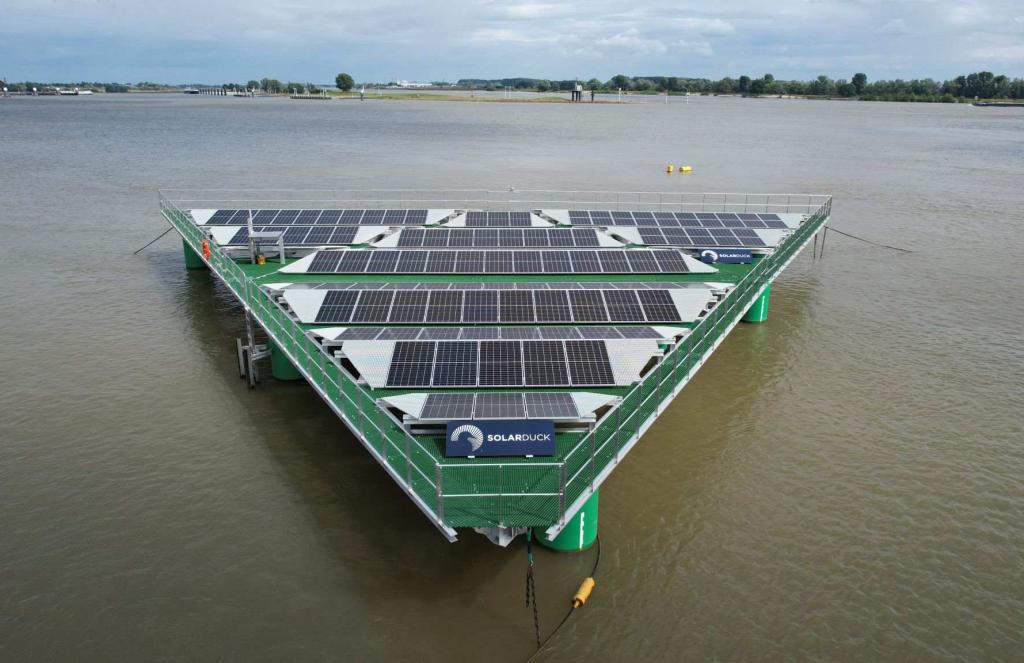Thessaloniki gets ready for its metro launch in November
The underground rapid transit lines have been under construction for almost two decades due to various project delays
 TheMayor.EU logo
TheMayor.EU logo 
SolarDuck's design has a triangular shape and will float meters above the sea, Source: SolarDuck on LinkedIn
The developers explain that the installation is supposed to float on the waves like a solar carpet
This week, German energy company RWE signed a deal with SolarDuck, a Dutch firm, to deploy offshore solar farms in the North Sea, off the coast of Belgium. SolarDuck’s floating solar installation is the first design in the world to receive certification by Bureau Veritas.
The key benefit of creating offshore photovoltaic installations is that they can be deployed along offshore wind farms. This would create a multiplication effect because of the complementary nature of both technologies. Also, it would be a more efficient use of space, as the floating solar installations are supposed to be deployed between the wind turbines.
One of the big challenges to building a floating solar farm is the fact that it needs to withstand heavy weather conditions, be water resistant, require little maintenance and be very durable in a corrosive environment. At the same time, it needs to sit relatively close to the surface of the water, as opposed to a wind turbine.
According to an official statement by RWE, SolarDuck’s floating solar farm features a triangular design, that is supposed to float several metres above the water, dangling with the waves ‘like a carpet’. This would help the installation keep its critical electrical components dry, clean and stable, while also allowing for a safe and stable submerged structure.
The installation off the coast of Belgium’s Ostend will be called Merganser and should be capable of producing 0.5-megawatt hours at peak production. The project is set to complete in 2023, which will only allow for faster commercial adoption of the innovative design.
SolarDuck CEO, Koen Burger, was quoted in a press statement explaining that the demand for sustainable and affordable energy in Europe is growing and the situation needs immediate solutions. At the same time, he pointed out that bringing solar energy into the ocean was the next frontier in the renewables sector.

The underground rapid transit lines have been under construction for almost two decades due to various project delays

Now you can get your wine in Talence by paying directly in Bitcoin

That’s because the state has to spend money on updating the railway infrastructure rather than subsidizing the cost of the popular pass

Rethinking renewable energy sources for the urban landscape

The examples, compiled by Beyond Fossil Fuels, can inform and inspire communities and entrepreneurs that still feel trepidation at the prospect of energy transition

Now you can get your wine in Talence by paying directly in Bitcoin

The 10th European Conference on Sustainable Cities and Towns (ESCT) sets the stage for stronger cooperation between the EU, national and local level to fast track Europe's transition to climate neutrality.

At least, that’s the promise made by the mayor of Paris, Anne Hidalgo

The underground rapid transit lines have been under construction for almost two decades due to various project delays

At least, that’s the promise made by the mayor of Paris, Anne Hidalgo

Hostal de Pinós is located in the geographical centre of the autonomous region

Despite its church-y name, the district has long been known as the hangout spot for the artsy crowds

Urban dwellers across the EU are having a say in making their surroundings friendlier to people and the environment.

Forests in the EU can help green the European construction industry and bolster a continent-wide push for architectural improvements.

Apply by 10 November and do your part for the transformation of European public spaces

An interview with the Mayor of a Polish city that seeks to reinvent itself

An interview with the newly elected ICLEI President and Mayor of Malmö

A conversation with the Mayor of Lisbon about the spirit and dimensions of innovation present in the Portuguese capital














